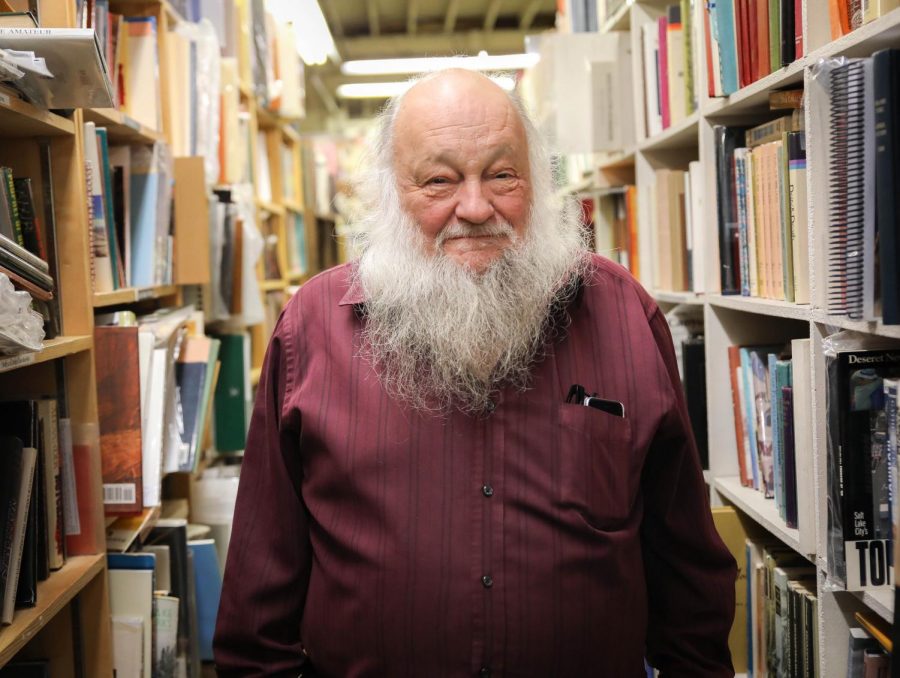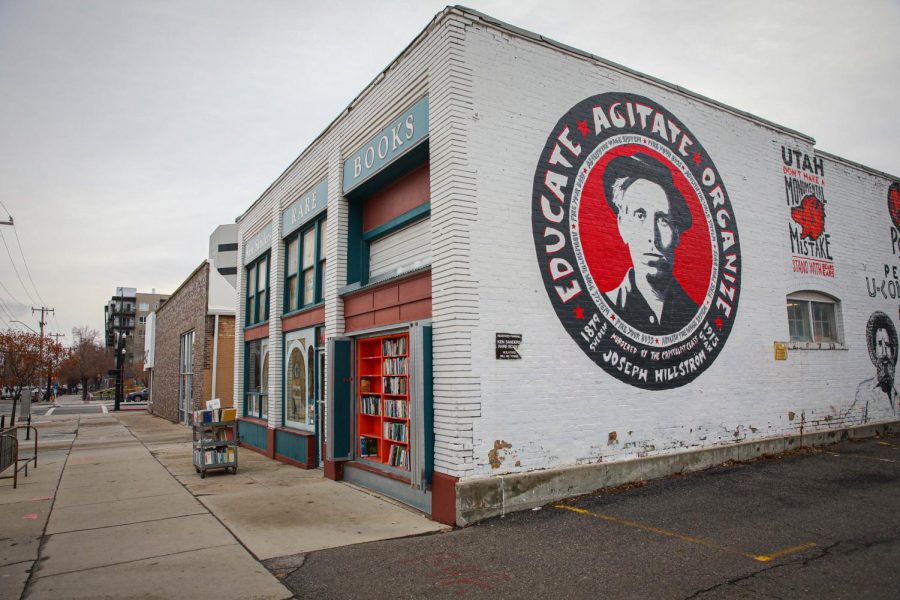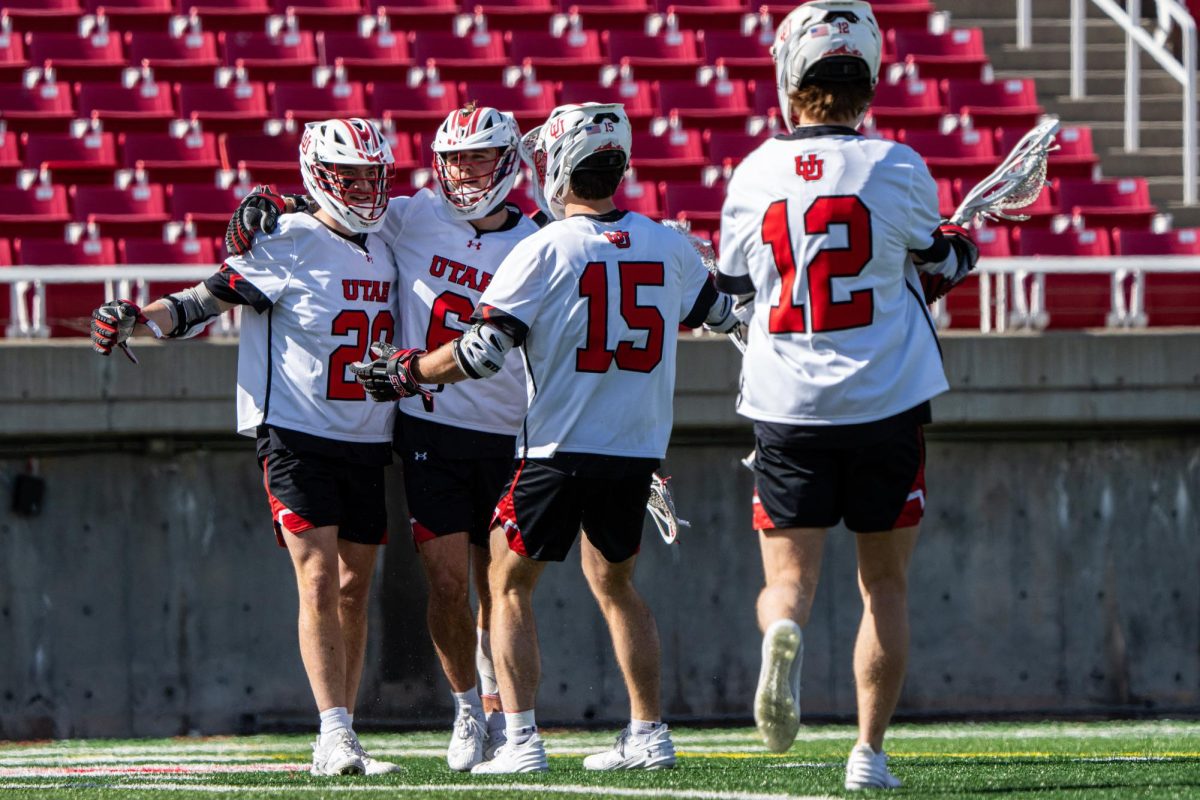Vanishing Bookstores, Rare Books in Rarer Places
Ken Sanders, owner of Ken Sanders Rare Book Store, Thursday, January 30, 2020, in Salt Lake City. (Photo by Cassandra Palor | Daily Utah Chronicle )
February 11, 2020
Through a glass door, there are rows and rows of books — on the sofa, on carts, on the coffee table, scattered on the floor, toppled on overstuffed shelves — and among the stacks, there’s Ken Sanders.
For 23 years, Ken Sanders Rare Books has been on 268 South 200 East in Salt Lake City, but this might not be the case for much longer. Rising property values have caused Sanders and other local businesses to consider relocation or the possibility of closing house.
When Sanders opened shop in 1997, he turned what was previously known as Cosmic Aeroplane into Rare Books. Sanders doesn’t consider himself a businessman, although he’s run various businesses throughout the years.
He is foremost a collector of words, and has been since the age of 14 when he began his collection by trading and selling comic books on the schoolyard. Since then, the real estate landscape around Sanders Rare Books has drastically changed.
“The valley is the same size physically, but there’s 3 million-plus people living in the state now,” Sanders said.
“I don’t understand,” he said, “why every single block — and I know that’s an exaggeration, but I love exaggeration, it makes a point — why every single block in this town is being turned into some high-rise development that’s creating apartments and condos that no one can afford.”
In the last decade, there’s been strong population growth in Utah, and according to researchers at the University of Utah, the housing shortage has persisted. There have been ongoing projects sectioned off in downtown Salt Lake, according to Downtown SLC Alliance. These projects are either under construction or their date has yet to be decided. The new buildings range from a new convention center to residential living spaces.
“What we have is a system where you have large developers coming in and looking to create the space for all the demand that we’re seeing, countered with small businesses which have been in their buildings … 25 to 30 years or more,” said Andrew Wittenberg, Marketing and Research Manager of the Salt Lake Department of Economic Development.
Wittenberg knows it’s a tough scenario because many small businesses don’t own the buildings they lease. “There’s relatively little protection for them to guard against rising rents,” he said. “As a city, we look to find solutions for problems like this.”
The Department of Economic Development does not currently have a program that administers for situations like the one Sanders is going through. However, the department is looking into different policies and programs that have been adopted in other cities, such as San Francisco, in regards to a legacy tenant program.
“Whatever happens to me, you know, I’m grown up. I can handle it. But I’m not going to quit selling books while I’m alive. But I won’t be selling them here anymore,” Sanders said.
What makes Sanders bookshop unique to the city are the antiquarian books he’s collected throughout the years. From the new to the rare or the used, aisles are stocked with books showcasing the heritage in Utah and in the West. One of the biggest sections Sanders offers is on The Church of Jesus Christ of Latter-day Saints.
Local bookstores around the nation have dwindled in numbers over the years, yet recently, there’s been a surge of independent bookstores, according to an interview conducted by Paddy Hirsch of NPR.
In Salt Lake City, there are a handful of independent bookstores, such as Wellers Book Works. Wellers has had a historic presence in Salt Lake since 1929. The store relocated from its longest lasting location on Main Street to Trolley Square in 2012.
Sanders signaled to the books inside his store and said, “I like shoes, I wear them every day. But selling shoes and selling books ain’t the same thing.”
“There’s a cultural aspect to books and literature, to the science of it all.”
To Sanders, this phenomenon is a metaphor for something much larger. “In 20 years from now I’m not going to be here, but the city will,” he said. “What do we want? What do you want — we the people want? We’re the taxpayers.”
Since a Salt Lake Tribune article came out explaining why Sanders’ store might close soon, he has received massive support from the community, which he said he’s grateful for.
Sanders wants the community to know that they are “not really closing — well, we’re going into a new chapter. And for people who want to support us, the best way is to come to the store and buy a book or go online.”
Ken Sanders Rare Books is currently accepting resumes for two part-time employees.














Nancy Lombardo • Feb 13, 2020 at 8:55 am
Very sad. And, they replaced the Gray Whale record store with a bridal shop. Go Utah!